Impact of Authentic Leadership, LMX, and PsyCap on Employees
VerifiedAdded on 2023/05/30
|11
|3070
|403
Essay
AI Summary
This essay delves into the intricate relationship between authentic leadership, Leader-Member Exchange (LMX), and employee psychological capital (PsyCap). It examines how authentic leadership, characterized by trustworthiness, creativity, and effective communication, influences employee performance and emotional capital. The discussion highlights the moderating effects of emotional capital and LMX on the relationship between leadership and employee outcomes, emphasizing the importance of trust, transparency, and relational connections. The essay further explores how different types of employees, such as white-collar and blue-collar workers, are affected by psychological capital, and how leadership development programs can foster efficacy, resilience, hope, and optimism within the workforce. The study concludes that authentic leadership positively influences employee performance, moderated by the psychological capital of followers, and that effective LMX and management support are crucial for building a positive work environment.
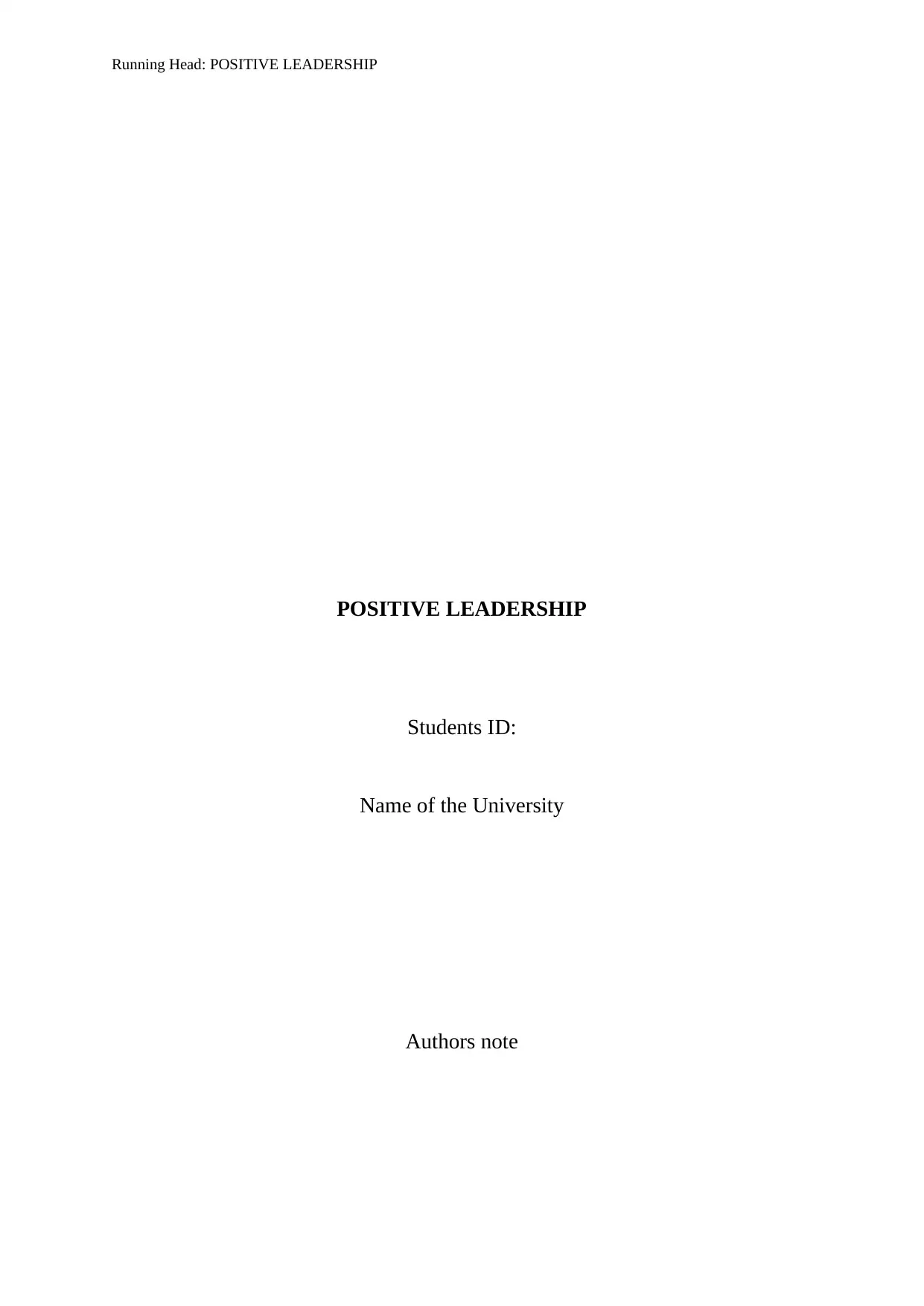
Running Head: POSITIVE LEADERSHIP
POSITIVE LEADERSHIP
Students ID:
Name of the University
Authors note
POSITIVE LEADERSHIP
Students ID:
Name of the University
Authors note
Paraphrase This Document
Need a fresh take? Get an instant paraphrase of this document with our AI Paraphraser
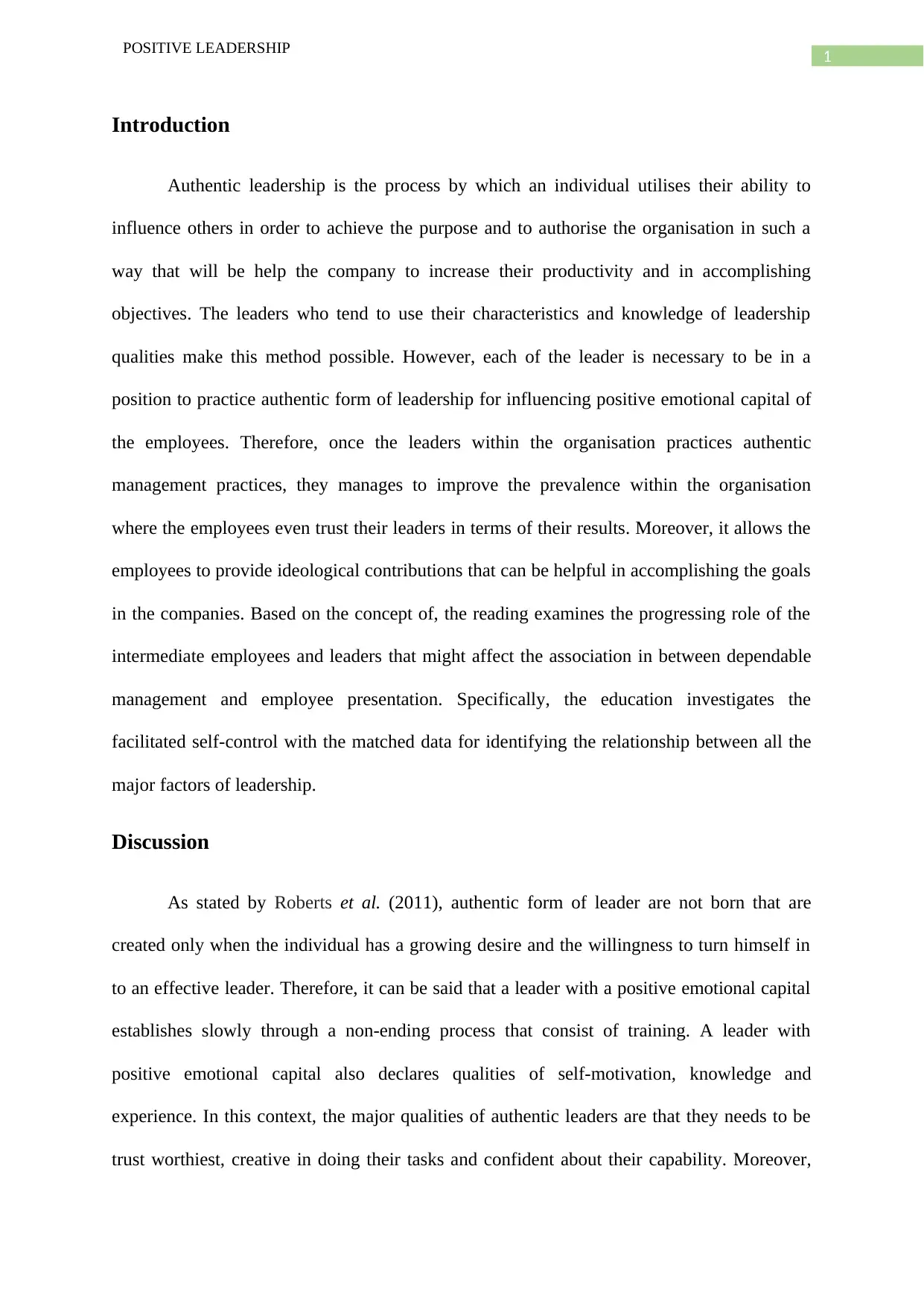
1
POSITIVE LEADERSHIP
Introduction
Authentic leadership is the process by which an individual utilises their ability to
influence others in order to achieve the purpose and to authorise the organisation in such a
way that will be help the company to increase their productivity and in accomplishing
objectives. The leaders who tend to use their characteristics and knowledge of leadership
qualities make this method possible. However, each of the leader is necessary to be in a
position to practice authentic form of leadership for influencing positive emotional capital of
the employees. Therefore, once the leaders within the organisation practices authentic
management practices, they manages to improve the prevalence within the organisation
where the employees even trust their leaders in terms of their results. Moreover, it allows the
employees to provide ideological contributions that can be helpful in accomplishing the goals
in the companies. Based on the concept of, the reading examines the progressing role of the
intermediate employees and leaders that might affect the association in between dependable
management and employee presentation. Specifically, the education investigates the
facilitated self-control with the matched data for identifying the relationship between all the
major factors of leadership.
Discussion
As stated by Roberts et al. (2011), authentic form of leader are not born that are
created only when the individual has a growing desire and the willingness to turn himself in
to an effective leader. Therefore, it can be said that a leader with a positive emotional capital
establishes slowly through a non-ending process that consist of training. A leader with
positive emotional capital also declares qualities of self-motivation, knowledge and
experience. In this context, the major qualities of authentic leaders are that they needs to be
trust worthiest, creative in doing their tasks and confident about their capability. Moreover,
POSITIVE LEADERSHIP
Introduction
Authentic leadership is the process by which an individual utilises their ability to
influence others in order to achieve the purpose and to authorise the organisation in such a
way that will be help the company to increase their productivity and in accomplishing
objectives. The leaders who tend to use their characteristics and knowledge of leadership
qualities make this method possible. However, each of the leader is necessary to be in a
position to practice authentic form of leadership for influencing positive emotional capital of
the employees. Therefore, once the leaders within the organisation practices authentic
management practices, they manages to improve the prevalence within the organisation
where the employees even trust their leaders in terms of their results. Moreover, it allows the
employees to provide ideological contributions that can be helpful in accomplishing the goals
in the companies. Based on the concept of, the reading examines the progressing role of the
intermediate employees and leaders that might affect the association in between dependable
management and employee presentation. Specifically, the education investigates the
facilitated self-control with the matched data for identifying the relationship between all the
major factors of leadership.
Discussion
As stated by Roberts et al. (2011), authentic form of leader are not born that are
created only when the individual has a growing desire and the willingness to turn himself in
to an effective leader. Therefore, it can be said that a leader with a positive emotional capital
establishes slowly through a non-ending process that consist of training. A leader with
positive emotional capital also declares qualities of self-motivation, knowledge and
experience. In this context, the major qualities of authentic leaders are that they needs to be
trust worthiest, creative in doing their tasks and confident about their capability. Moreover,
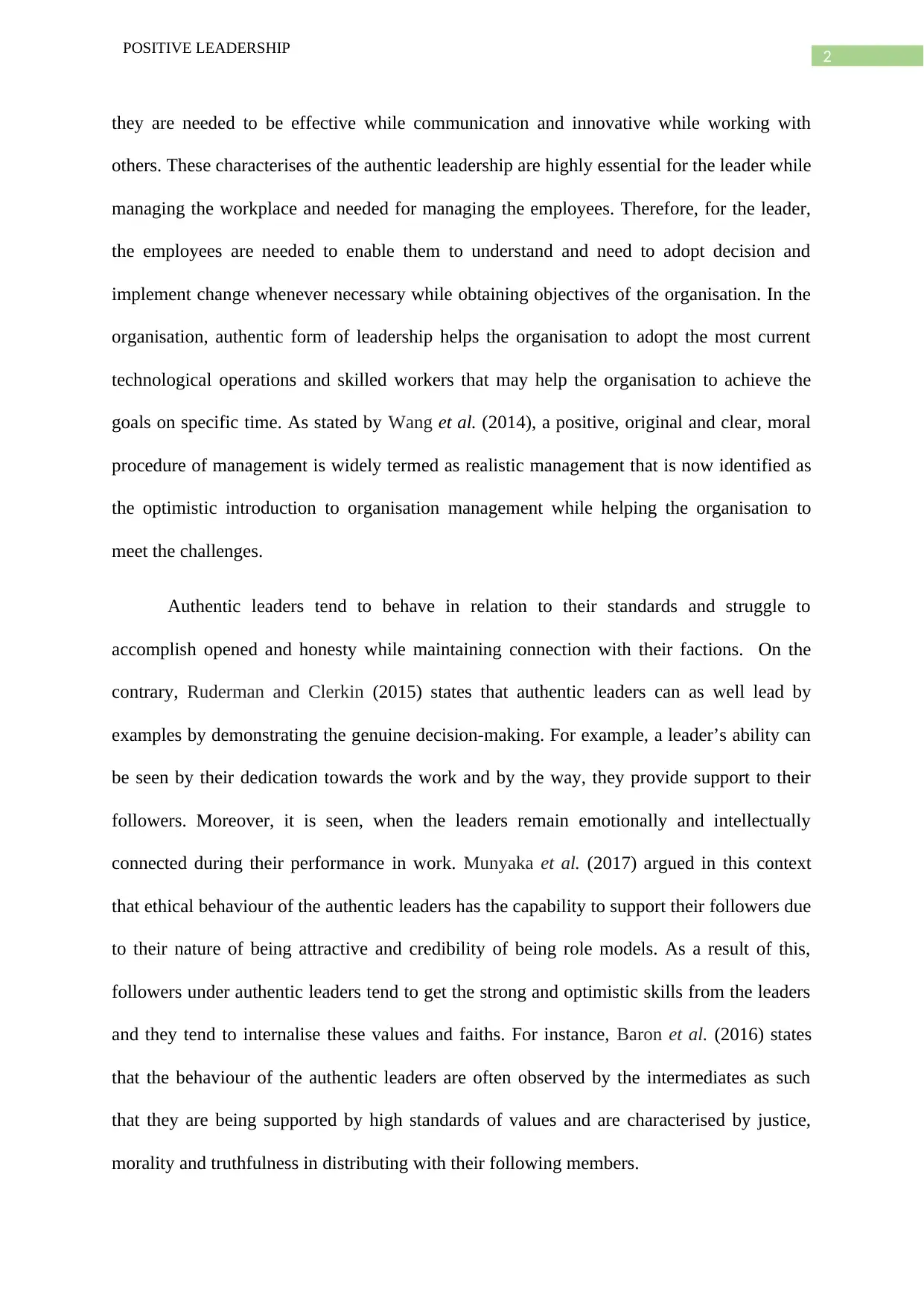
2
POSITIVE LEADERSHIP
they are needed to be effective while communication and innovative while working with
others. These characterises of the authentic leadership are highly essential for the leader while
managing the workplace and needed for managing the employees. Therefore, for the leader,
the employees are needed to enable them to understand and need to adopt decision and
implement change whenever necessary while obtaining objectives of the organisation. In the
organisation, authentic form of leadership helps the organisation to adopt the most current
technological operations and skilled workers that may help the organisation to achieve the
goals on specific time. As stated by Wang et al. (2014), a positive, original and clear, moral
procedure of management is widely termed as realistic management that is now identified as
the optimistic introduction to organisation management while helping the organisation to
meet the challenges.
Authentic leaders tend to behave in relation to their standards and struggle to
accomplish opened and honesty while maintaining connection with their factions. On the
contrary, Ruderman and Clerkin (2015) states that authentic leaders can as well lead by
examples by demonstrating the genuine decision-making. For example, a leader’s ability can
be seen by their dedication towards the work and by the way, they provide support to their
followers. Moreover, it is seen, when the leaders remain emotionally and intellectually
connected during their performance in work. Munyaka et al. (2017) argued in this context
that ethical behaviour of the authentic leaders has the capability to support their followers due
to their nature of being attractive and credibility of being role models. As a result of this,
followers under authentic leaders tend to get the strong and optimistic skills from the leaders
and they tend to internalise these values and faiths. For instance, Baron et al. (2016) states
that the behaviour of the authentic leaders are often observed by the intermediates as such
that they are being supported by high standards of values and are characterised by justice,
morality and truthfulness in distributing with their following members.
POSITIVE LEADERSHIP
they are needed to be effective while communication and innovative while working with
others. These characterises of the authentic leadership are highly essential for the leader while
managing the workplace and needed for managing the employees. Therefore, for the leader,
the employees are needed to enable them to understand and need to adopt decision and
implement change whenever necessary while obtaining objectives of the organisation. In the
organisation, authentic form of leadership helps the organisation to adopt the most current
technological operations and skilled workers that may help the organisation to achieve the
goals on specific time. As stated by Wang et al. (2014), a positive, original and clear, moral
procedure of management is widely termed as realistic management that is now identified as
the optimistic introduction to organisation management while helping the organisation to
meet the challenges.
Authentic leaders tend to behave in relation to their standards and struggle to
accomplish opened and honesty while maintaining connection with their factions. On the
contrary, Ruderman and Clerkin (2015) states that authentic leaders can as well lead by
examples by demonstrating the genuine decision-making. For example, a leader’s ability can
be seen by their dedication towards the work and by the way, they provide support to their
followers. Moreover, it is seen, when the leaders remain emotionally and intellectually
connected during their performance in work. Munyaka et al. (2017) argued in this context
that ethical behaviour of the authentic leaders has the capability to support their followers due
to their nature of being attractive and credibility of being role models. As a result of this,
followers under authentic leaders tend to get the strong and optimistic skills from the leaders
and they tend to internalise these values and faiths. For instance, Baron et al. (2016) states
that the behaviour of the authentic leaders are often observed by the intermediates as such
that they are being supported by high standards of values and are characterised by justice,
morality and truthfulness in distributing with their following members.
⊘ This is a preview!⊘
Do you want full access?
Subscribe today to unlock all pages.

Trusted by 1+ million students worldwide
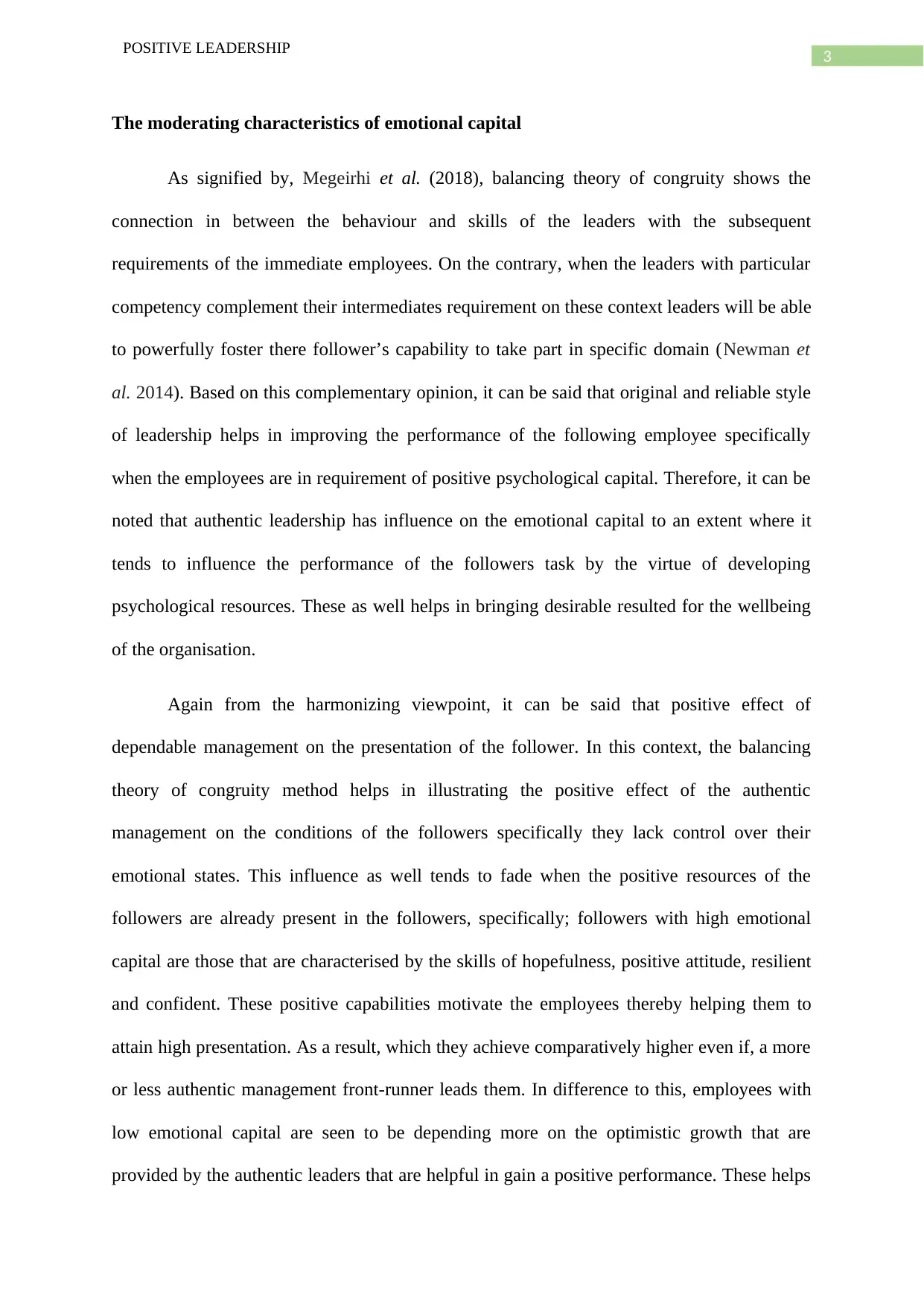
3
POSITIVE LEADERSHIP
The moderating characteristics of emotional capital
As signified by, Megeirhi et al. (2018), balancing theory of congruity shows the
connection in between the behaviour and skills of the leaders with the subsequent
requirements of the immediate employees. On the contrary, when the leaders with particular
competency complement their intermediates requirement on these context leaders will be able
to powerfully foster there follower’s capability to take part in specific domain (Newman et
al. 2014). Based on this complementary opinion, it can be said that original and reliable style
of leadership helps in improving the performance of the following employee specifically
when the employees are in requirement of positive psychological capital. Therefore, it can be
noted that authentic leadership has influence on the emotional capital to an extent where it
tends to influence the performance of the followers task by the virtue of developing
psychological resources. These as well helps in bringing desirable resulted for the wellbeing
of the organisation.
Again from the harmonizing viewpoint, it can be said that positive effect of
dependable management on the presentation of the follower. In this context, the balancing
theory of congruity method helps in illustrating the positive effect of the authentic
management on the conditions of the followers specifically they lack control over their
emotional states. This influence as well tends to fade when the positive resources of the
followers are already present in the followers, specifically; followers with high emotional
capital are those that are characterised by the skills of hopefulness, positive attitude, resilient
and confident. These positive capabilities motivate the employees thereby helping them to
attain high presentation. As a result, which they achieve comparatively higher even if, a more
or less authentic management front-runner leads them. In difference to this, employees with
low emotional capital are seen to be depending more on the optimistic growth that are
provided by the authentic leaders that are helpful in gain a positive performance. These helps
POSITIVE LEADERSHIP
The moderating characteristics of emotional capital
As signified by, Megeirhi et al. (2018), balancing theory of congruity shows the
connection in between the behaviour and skills of the leaders with the subsequent
requirements of the immediate employees. On the contrary, when the leaders with particular
competency complement their intermediates requirement on these context leaders will be able
to powerfully foster there follower’s capability to take part in specific domain (Newman et
al. 2014). Based on this complementary opinion, it can be said that original and reliable style
of leadership helps in improving the performance of the following employee specifically
when the employees are in requirement of positive psychological capital. Therefore, it can be
noted that authentic leadership has influence on the emotional capital to an extent where it
tends to influence the performance of the followers task by the virtue of developing
psychological resources. These as well helps in bringing desirable resulted for the wellbeing
of the organisation.
Again from the harmonizing viewpoint, it can be said that positive effect of
dependable management on the presentation of the follower. In this context, the balancing
theory of congruity method helps in illustrating the positive effect of the authentic
management on the conditions of the followers specifically they lack control over their
emotional states. This influence as well tends to fade when the positive resources of the
followers are already present in the followers, specifically; followers with high emotional
capital are those that are characterised by the skills of hopefulness, positive attitude, resilient
and confident. These positive capabilities motivate the employees thereby helping them to
attain high presentation. As a result, which they achieve comparatively higher even if, a more
or less authentic management front-runner leads them. In difference to this, employees with
low emotional capital are seen to be depending more on the optimistic growth that are
provided by the authentic leaders that are helpful in gain a positive performance. These helps
Paraphrase This Document
Need a fresh take? Get an instant paraphrase of this document with our AI Paraphraser
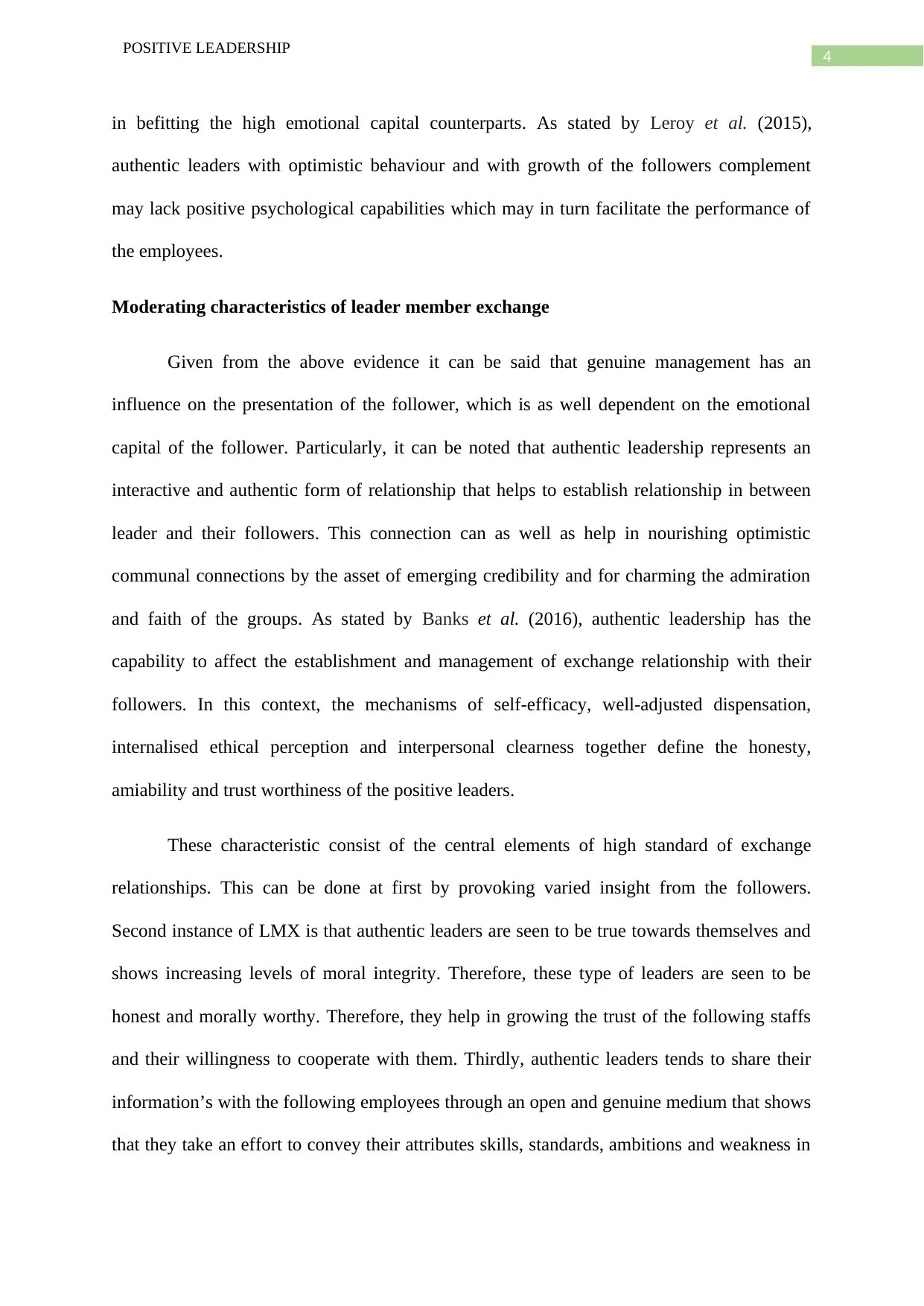
4
POSITIVE LEADERSHIP
in befitting the high emotional capital counterparts. As stated by Leroy et al. (2015),
authentic leaders with optimistic behaviour and with growth of the followers complement
may lack positive psychological capabilities which may in turn facilitate the performance of
the employees.
Moderating characteristics of leader member exchange
Given from the above evidence it can be said that genuine management has an
influence on the presentation of the follower, which is as well dependent on the emotional
capital of the follower. Particularly, it can be noted that authentic leadership represents an
interactive and authentic form of relationship that helps to establish relationship in between
leader and their followers. This connection can as well as help in nourishing optimistic
communal connections by the asset of emerging credibility and for charming the admiration
and faith of the groups. As stated by Banks et al. (2016), authentic leadership has the
capability to affect the establishment and management of exchange relationship with their
followers. In this context, the mechanisms of self-efficacy, well-adjusted dispensation,
internalised ethical perception and interpersonal clearness together define the honesty,
amiability and trust worthiness of the positive leaders.
These characteristic consist of the central elements of high standard of exchange
relationships. This can be done at first by provoking varied insight from the followers.
Second instance of LMX is that authentic leaders are seen to be true towards themselves and
shows increasing levels of moral integrity. Therefore, these type of leaders are seen to be
honest and morally worthy. Therefore, they help in growing the trust of the following staffs
and their willingness to cooperate with them. Thirdly, authentic leaders tends to share their
information’s with the following employees through an open and genuine medium that shows
that they take an effort to convey their attributes skills, standards, ambitions and weakness in
POSITIVE LEADERSHIP
in befitting the high emotional capital counterparts. As stated by Leroy et al. (2015),
authentic leaders with optimistic behaviour and with growth of the followers complement
may lack positive psychological capabilities which may in turn facilitate the performance of
the employees.
Moderating characteristics of leader member exchange
Given from the above evidence it can be said that genuine management has an
influence on the presentation of the follower, which is as well dependent on the emotional
capital of the follower. Particularly, it can be noted that authentic leadership represents an
interactive and authentic form of relationship that helps to establish relationship in between
leader and their followers. This connection can as well as help in nourishing optimistic
communal connections by the asset of emerging credibility and for charming the admiration
and faith of the groups. As stated by Banks et al. (2016), authentic leadership has the
capability to affect the establishment and management of exchange relationship with their
followers. In this context, the mechanisms of self-efficacy, well-adjusted dispensation,
internalised ethical perception and interpersonal clearness together define the honesty,
amiability and trust worthiness of the positive leaders.
These characteristic consist of the central elements of high standard of exchange
relationships. This can be done at first by provoking varied insight from the followers.
Second instance of LMX is that authentic leaders are seen to be true towards themselves and
shows increasing levels of moral integrity. Therefore, these type of leaders are seen to be
honest and morally worthy. Therefore, they help in growing the trust of the following staffs
and their willingness to cooperate with them. Thirdly, authentic leaders tends to share their
information’s with the following employees through an open and genuine medium that shows
that they take an effort to convey their attributes skills, standards, ambitions and weakness in
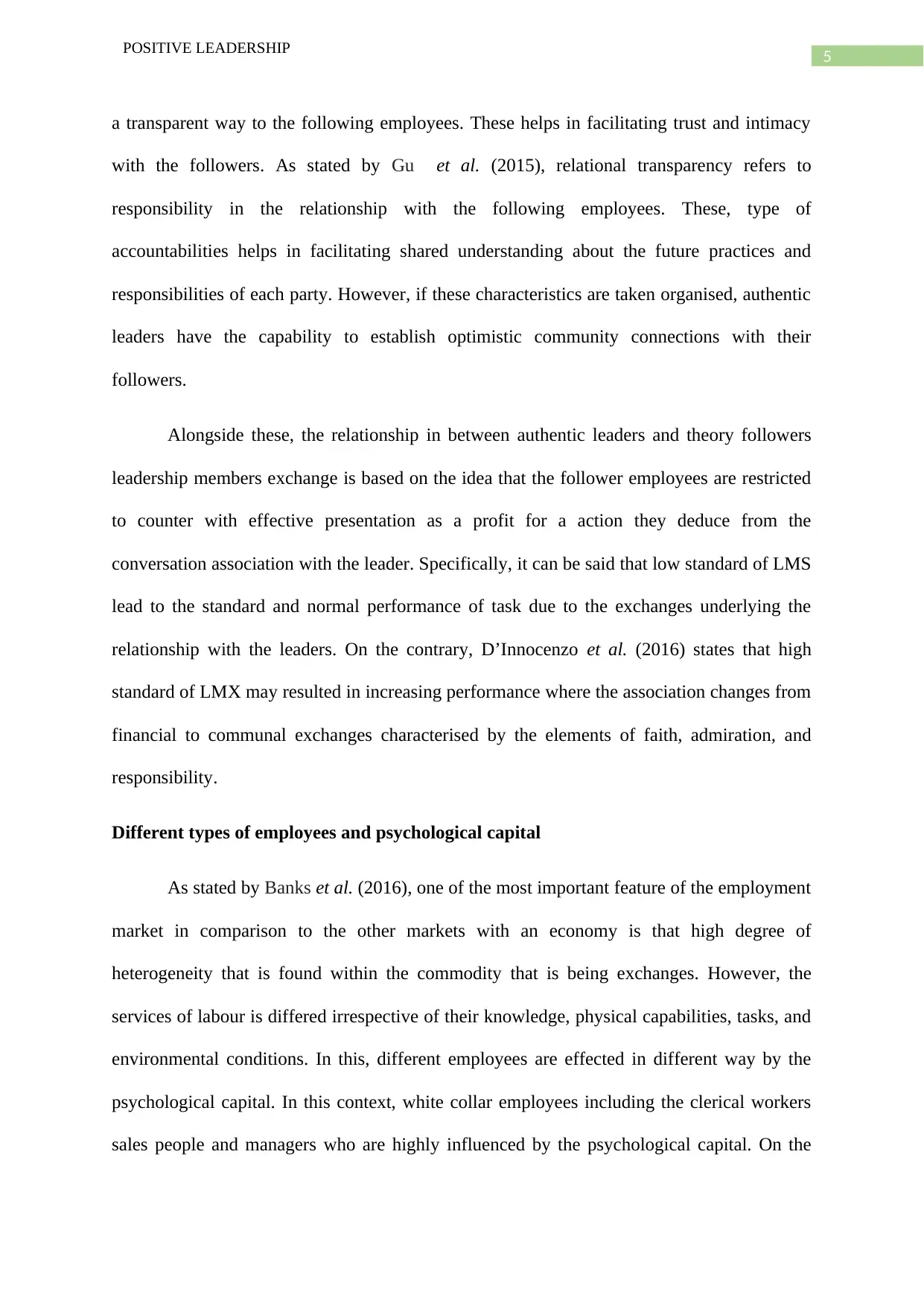
5
POSITIVE LEADERSHIP
a transparent way to the following employees. These helps in facilitating trust and intimacy
with the followers. As stated by Gu et al. (2015), relational transparency refers to
responsibility in the relationship with the following employees. These, type of
accountabilities helps in facilitating shared understanding about the future practices and
responsibilities of each party. However, if these characteristics are taken organised, authentic
leaders have the capability to establish optimistic community connections with their
followers.
Alongside these, the relationship in between authentic leaders and theory followers
leadership members exchange is based on the idea that the follower employees are restricted
to counter with effective presentation as a profit for a action they deduce from the
conversation association with the leader. Specifically, it can be said that low standard of LMS
lead to the standard and normal performance of task due to the exchanges underlying the
relationship with the leaders. On the contrary, D’Innocenzo et al. (2016) states that high
standard of LMX may resulted in increasing performance where the association changes from
financial to communal exchanges characterised by the elements of faith, admiration, and
responsibility.
Different types of employees and psychological capital
As stated by Banks et al. (2016), one of the most important feature of the employment
market in comparison to the other markets with an economy is that high degree of
heterogeneity that is found within the commodity that is being exchanges. However, the
services of labour is differed irrespective of their knowledge, physical capabilities, tasks, and
environmental conditions. In this, different employees are effected in different way by the
psychological capital. In this context, white collar employees including the clerical workers
sales people and managers who are highly influenced by the psychological capital. On the
POSITIVE LEADERSHIP
a transparent way to the following employees. These helps in facilitating trust and intimacy
with the followers. As stated by Gu et al. (2015), relational transparency refers to
responsibility in the relationship with the following employees. These, type of
accountabilities helps in facilitating shared understanding about the future practices and
responsibilities of each party. However, if these characteristics are taken organised, authentic
leaders have the capability to establish optimistic community connections with their
followers.
Alongside these, the relationship in between authentic leaders and theory followers
leadership members exchange is based on the idea that the follower employees are restricted
to counter with effective presentation as a profit for a action they deduce from the
conversation association with the leader. Specifically, it can be said that low standard of LMS
lead to the standard and normal performance of task due to the exchanges underlying the
relationship with the leaders. On the contrary, D’Innocenzo et al. (2016) states that high
standard of LMX may resulted in increasing performance where the association changes from
financial to communal exchanges characterised by the elements of faith, admiration, and
responsibility.
Different types of employees and psychological capital
As stated by Banks et al. (2016), one of the most important feature of the employment
market in comparison to the other markets with an economy is that high degree of
heterogeneity that is found within the commodity that is being exchanges. However, the
services of labour is differed irrespective of their knowledge, physical capabilities, tasks, and
environmental conditions. In this, different employees are effected in different way by the
psychological capital. In this context, white collar employees including the clerical workers
sales people and managers who are highly influenced by the psychological capital. On the
⊘ This is a preview!⊘
Do you want full access?
Subscribe today to unlock all pages.

Trusted by 1+ million students worldwide
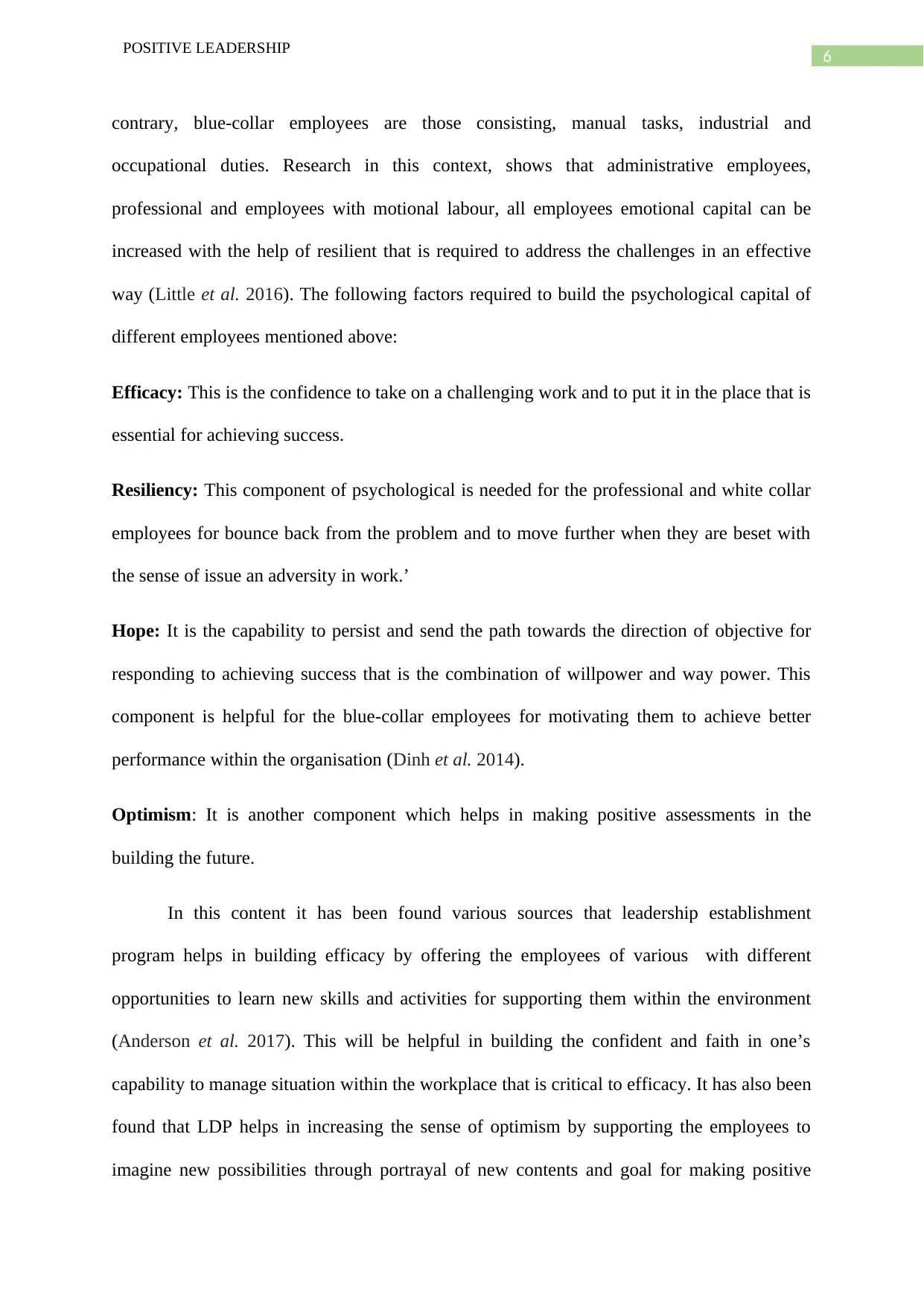
6
POSITIVE LEADERSHIP
contrary, blue-collar employees are those consisting, manual tasks, industrial and
occupational duties. Research in this context, shows that administrative employees,
professional and employees with motional labour, all employees emotional capital can be
increased with the help of resilient that is required to address the challenges in an effective
way (Little et al. 2016). The following factors required to build the psychological capital of
different employees mentioned above:
Efficacy: This is the confidence to take on a challenging work and to put it in the place that is
essential for achieving success.
Resiliency: This component of psychological is needed for the professional and white collar
employees for bounce back from the problem and to move further when they are beset with
the sense of issue an adversity in work.’
Hope: It is the capability to persist and send the path towards the direction of objective for
responding to achieving success that is the combination of willpower and way power. This
component is helpful for the blue-collar employees for motivating them to achieve better
performance within the organisation (Dinh et al. 2014).
Optimism: It is another component which helps in making positive assessments in the
building the future.
In this content it has been found various sources that leadership establishment
program helps in building efficacy by offering the employees of various with different
opportunities to learn new skills and activities for supporting them within the environment
(Anderson et al. 2017). This will be helpful in building the confident and faith in one’s
capability to manage situation within the workplace that is critical to efficacy. It has also been
found that LDP helps in increasing the sense of optimism by supporting the employees to
imagine new possibilities through portrayal of new contents and goal for making positive
POSITIVE LEADERSHIP
contrary, blue-collar employees are those consisting, manual tasks, industrial and
occupational duties. Research in this context, shows that administrative employees,
professional and employees with motional labour, all employees emotional capital can be
increased with the help of resilient that is required to address the challenges in an effective
way (Little et al. 2016). The following factors required to build the psychological capital of
different employees mentioned above:
Efficacy: This is the confidence to take on a challenging work and to put it in the place that is
essential for achieving success.
Resiliency: This component of psychological is needed for the professional and white collar
employees for bounce back from the problem and to move further when they are beset with
the sense of issue an adversity in work.’
Hope: It is the capability to persist and send the path towards the direction of objective for
responding to achieving success that is the combination of willpower and way power. This
component is helpful for the blue-collar employees for motivating them to achieve better
performance within the organisation (Dinh et al. 2014).
Optimism: It is another component which helps in making positive assessments in the
building the future.
In this content it has been found various sources that leadership establishment
program helps in building efficacy by offering the employees of various with different
opportunities to learn new skills and activities for supporting them within the environment
(Anderson et al. 2017). This will be helpful in building the confident and faith in one’s
capability to manage situation within the workplace that is critical to efficacy. It has also been
found that LDP helps in increasing the sense of optimism by supporting the employees to
imagine new possibilities through portrayal of new contents and goal for making positive
Paraphrase This Document
Need a fresh take? Get an instant paraphrase of this document with our AI Paraphraser
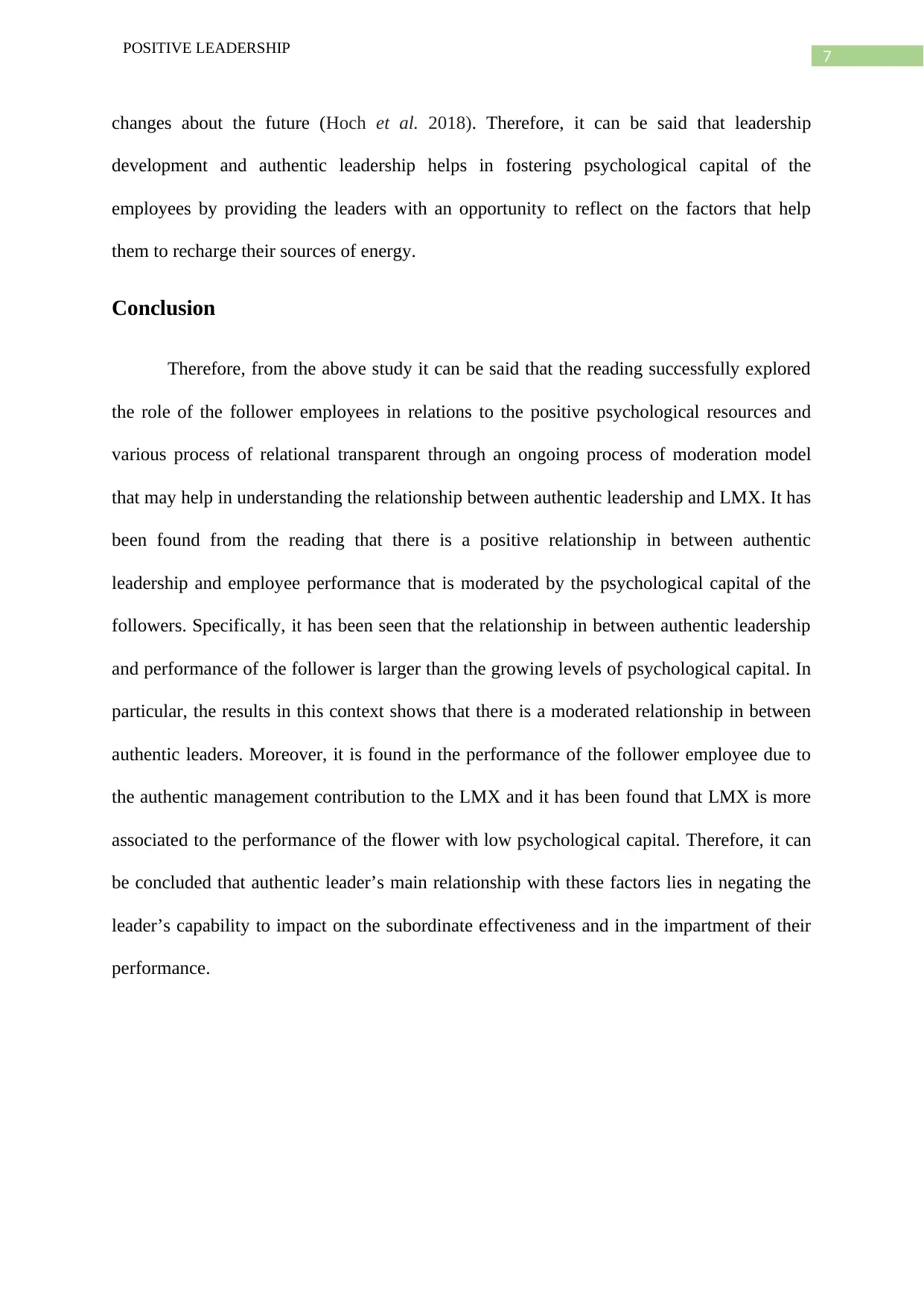
7
POSITIVE LEADERSHIP
changes about the future (Hoch et al. 2018). Therefore, it can be said that leadership
development and authentic leadership helps in fostering psychological capital of the
employees by providing the leaders with an opportunity to reflect on the factors that help
them to recharge their sources of energy.
Conclusion
Therefore, from the above study it can be said that the reading successfully explored
the role of the follower employees in relations to the positive psychological resources and
various process of relational transparent through an ongoing process of moderation model
that may help in understanding the relationship between authentic leadership and LMX. It has
been found from the reading that there is a positive relationship in between authentic
leadership and employee performance that is moderated by the psychological capital of the
followers. Specifically, it has been seen that the relationship in between authentic leadership
and performance of the follower is larger than the growing levels of psychological capital. In
particular, the results in this context shows that there is a moderated relationship in between
authentic leaders. Moreover, it is found in the performance of the follower employee due to
the authentic management contribution to the LMX and it has been found that LMX is more
associated to the performance of the flower with low psychological capital. Therefore, it can
be concluded that authentic leader’s main relationship with these factors lies in negating the
leader’s capability to impact on the subordinate effectiveness and in the impartment of their
performance.
POSITIVE LEADERSHIP
changes about the future (Hoch et al. 2018). Therefore, it can be said that leadership
development and authentic leadership helps in fostering psychological capital of the
employees by providing the leaders with an opportunity to reflect on the factors that help
them to recharge their sources of energy.
Conclusion
Therefore, from the above study it can be said that the reading successfully explored
the role of the follower employees in relations to the positive psychological resources and
various process of relational transparent through an ongoing process of moderation model
that may help in understanding the relationship between authentic leadership and LMX. It has
been found from the reading that there is a positive relationship in between authentic
leadership and employee performance that is moderated by the psychological capital of the
followers. Specifically, it has been seen that the relationship in between authentic leadership
and performance of the follower is larger than the growing levels of psychological capital. In
particular, the results in this context shows that there is a moderated relationship in between
authentic leaders. Moreover, it is found in the performance of the follower employee due to
the authentic management contribution to the LMX and it has been found that LMX is more
associated to the performance of the flower with low psychological capital. Therefore, it can
be concluded that authentic leader’s main relationship with these factors lies in negating the
leader’s capability to impact on the subordinate effectiveness and in the impartment of their
performance.
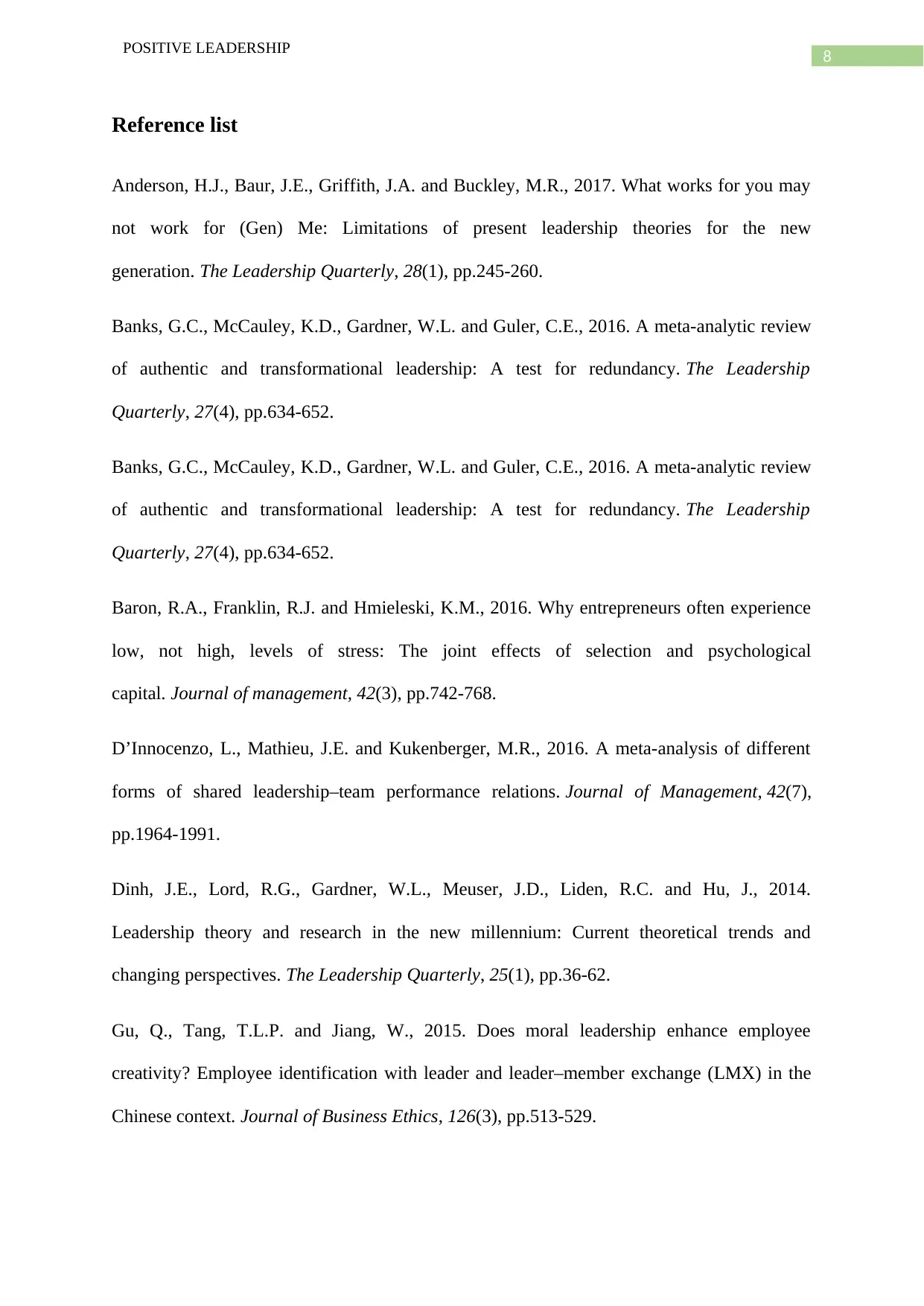
8
POSITIVE LEADERSHIP
Reference list
Anderson, H.J., Baur, J.E., Griffith, J.A. and Buckley, M.R., 2017. What works for you may
not work for (Gen) Me: Limitations of present leadership theories for the new
generation. The Leadership Quarterly, 28(1), pp.245-260.
Banks, G.C., McCauley, K.D., Gardner, W.L. and Guler, C.E., 2016. A meta-analytic review
of authentic and transformational leadership: A test for redundancy. The Leadership
Quarterly, 27(4), pp.634-652.
Banks, G.C., McCauley, K.D., Gardner, W.L. and Guler, C.E., 2016. A meta-analytic review
of authentic and transformational leadership: A test for redundancy. The Leadership
Quarterly, 27(4), pp.634-652.
Baron, R.A., Franklin, R.J. and Hmieleski, K.M., 2016. Why entrepreneurs often experience
low, not high, levels of stress: The joint effects of selection and psychological
capital. Journal of management, 42(3), pp.742-768.
D’Innocenzo, L., Mathieu, J.E. and Kukenberger, M.R., 2016. A meta-analysis of different
forms of shared leadership–team performance relations. Journal of Management, 42(7),
pp.1964-1991.
Dinh, J.E., Lord, R.G., Gardner, W.L., Meuser, J.D., Liden, R.C. and Hu, J., 2014.
Leadership theory and research in the new millennium: Current theoretical trends and
changing perspectives. The Leadership Quarterly, 25(1), pp.36-62.
Gu, Q., Tang, T.L.P. and Jiang, W., 2015. Does moral leadership enhance employee
creativity? Employee identification with leader and leader–member exchange (LMX) in the
Chinese context. Journal of Business Ethics, 126(3), pp.513-529.
POSITIVE LEADERSHIP
Reference list
Anderson, H.J., Baur, J.E., Griffith, J.A. and Buckley, M.R., 2017. What works for you may
not work for (Gen) Me: Limitations of present leadership theories for the new
generation. The Leadership Quarterly, 28(1), pp.245-260.
Banks, G.C., McCauley, K.D., Gardner, W.L. and Guler, C.E., 2016. A meta-analytic review
of authentic and transformational leadership: A test for redundancy. The Leadership
Quarterly, 27(4), pp.634-652.
Banks, G.C., McCauley, K.D., Gardner, W.L. and Guler, C.E., 2016. A meta-analytic review
of authentic and transformational leadership: A test for redundancy. The Leadership
Quarterly, 27(4), pp.634-652.
Baron, R.A., Franklin, R.J. and Hmieleski, K.M., 2016. Why entrepreneurs often experience
low, not high, levels of stress: The joint effects of selection and psychological
capital. Journal of management, 42(3), pp.742-768.
D’Innocenzo, L., Mathieu, J.E. and Kukenberger, M.R., 2016. A meta-analysis of different
forms of shared leadership–team performance relations. Journal of Management, 42(7),
pp.1964-1991.
Dinh, J.E., Lord, R.G., Gardner, W.L., Meuser, J.D., Liden, R.C. and Hu, J., 2014.
Leadership theory and research in the new millennium: Current theoretical trends and
changing perspectives. The Leadership Quarterly, 25(1), pp.36-62.
Gu, Q., Tang, T.L.P. and Jiang, W., 2015. Does moral leadership enhance employee
creativity? Employee identification with leader and leader–member exchange (LMX) in the
Chinese context. Journal of Business Ethics, 126(3), pp.513-529.
⊘ This is a preview!⊘
Do you want full access?
Subscribe today to unlock all pages.

Trusted by 1+ million students worldwide
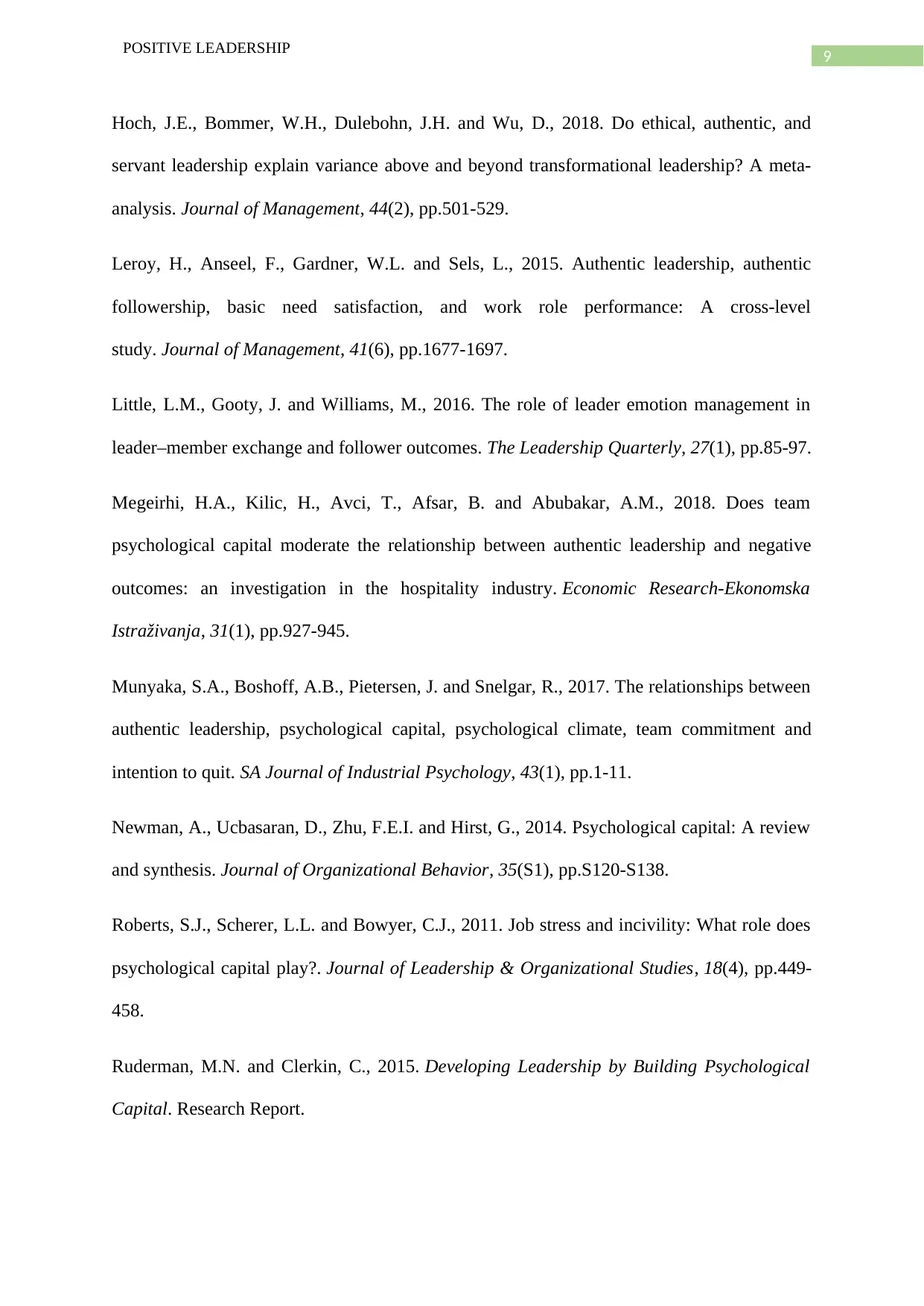
9
POSITIVE LEADERSHIP
Hoch, J.E., Bommer, W.H., Dulebohn, J.H. and Wu, D., 2018. Do ethical, authentic, and
servant leadership explain variance above and beyond transformational leadership? A meta-
analysis. Journal of Management, 44(2), pp.501-529.
Leroy, H., Anseel, F., Gardner, W.L. and Sels, L., 2015. Authentic leadership, authentic
followership, basic need satisfaction, and work role performance: A cross-level
study. Journal of Management, 41(6), pp.1677-1697.
Little, L.M., Gooty, J. and Williams, M., 2016. The role of leader emotion management in
leader–member exchange and follower outcomes. The Leadership Quarterly, 27(1), pp.85-97.
Megeirhi, H.A., Kilic, H., Avci, T., Afsar, B. and Abubakar, A.M., 2018. Does team
psychological capital moderate the relationship between authentic leadership and negative
outcomes: an investigation in the hospitality industry. Economic Research-Ekonomska
Istraživanja, 31(1), pp.927-945.
Munyaka, S.A., Boshoff, A.B., Pietersen, J. and Snelgar, R., 2017. The relationships between
authentic leadership, psychological capital, psychological climate, team commitment and
intention to quit. SA Journal of Industrial Psychology, 43(1), pp.1-11.
Newman, A., Ucbasaran, D., Zhu, F.E.I. and Hirst, G., 2014. Psychological capital: A review
and synthesis. Journal of Organizational Behavior, 35(S1), pp.S120-S138.
Roberts, S.J., Scherer, L.L. and Bowyer, C.J., 2011. Job stress and incivility: What role does
psychological capital play?. Journal of Leadership & Organizational Studies, 18(4), pp.449-
458.
Ruderman, M.N. and Clerkin, C., 2015. Developing Leadership by Building Psychological
Capital. Research Report.
POSITIVE LEADERSHIP
Hoch, J.E., Bommer, W.H., Dulebohn, J.H. and Wu, D., 2018. Do ethical, authentic, and
servant leadership explain variance above and beyond transformational leadership? A meta-
analysis. Journal of Management, 44(2), pp.501-529.
Leroy, H., Anseel, F., Gardner, W.L. and Sels, L., 2015. Authentic leadership, authentic
followership, basic need satisfaction, and work role performance: A cross-level
study. Journal of Management, 41(6), pp.1677-1697.
Little, L.M., Gooty, J. and Williams, M., 2016. The role of leader emotion management in
leader–member exchange and follower outcomes. The Leadership Quarterly, 27(1), pp.85-97.
Megeirhi, H.A., Kilic, H., Avci, T., Afsar, B. and Abubakar, A.M., 2018. Does team
psychological capital moderate the relationship between authentic leadership and negative
outcomes: an investigation in the hospitality industry. Economic Research-Ekonomska
Istraživanja, 31(1), pp.927-945.
Munyaka, S.A., Boshoff, A.B., Pietersen, J. and Snelgar, R., 2017. The relationships between
authentic leadership, psychological capital, psychological climate, team commitment and
intention to quit. SA Journal of Industrial Psychology, 43(1), pp.1-11.
Newman, A., Ucbasaran, D., Zhu, F.E.I. and Hirst, G., 2014. Psychological capital: A review
and synthesis. Journal of Organizational Behavior, 35(S1), pp.S120-S138.
Roberts, S.J., Scherer, L.L. and Bowyer, C.J., 2011. Job stress and incivility: What role does
psychological capital play?. Journal of Leadership & Organizational Studies, 18(4), pp.449-
458.
Ruderman, M.N. and Clerkin, C., 2015. Developing Leadership by Building Psychological
Capital. Research Report.
Paraphrase This Document
Need a fresh take? Get an instant paraphrase of this document with our AI Paraphraser
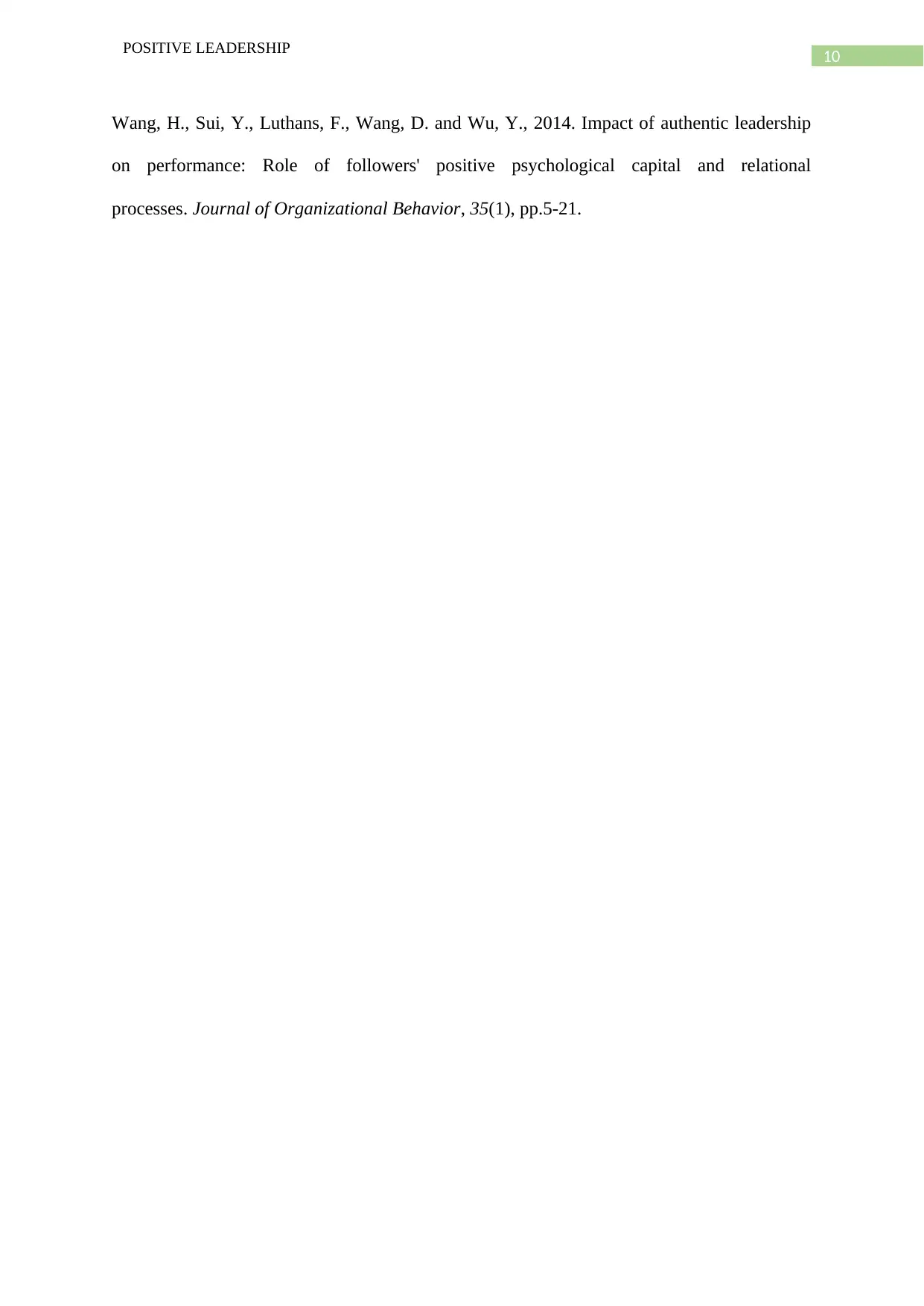
10
POSITIVE LEADERSHIP
Wang, H., Sui, Y., Luthans, F., Wang, D. and Wu, Y., 2014. Impact of authentic leadership
on performance: Role of followers' positive psychological capital and relational
processes. Journal of Organizational Behavior, 35(1), pp.5-21.
POSITIVE LEADERSHIP
Wang, H., Sui, Y., Luthans, F., Wang, D. and Wu, Y., 2014. Impact of authentic leadership
on performance: Role of followers' positive psychological capital and relational
processes. Journal of Organizational Behavior, 35(1), pp.5-21.
1 out of 11
Related Documents
Your All-in-One AI-Powered Toolkit for Academic Success.
+13062052269
info@desklib.com
Available 24*7 on WhatsApp / Email
![[object Object]](/_next/static/media/star-bottom.7253800d.svg)
Unlock your academic potential
Copyright © 2020–2026 A2Z Services. All Rights Reserved. Developed and managed by ZUCOL.





